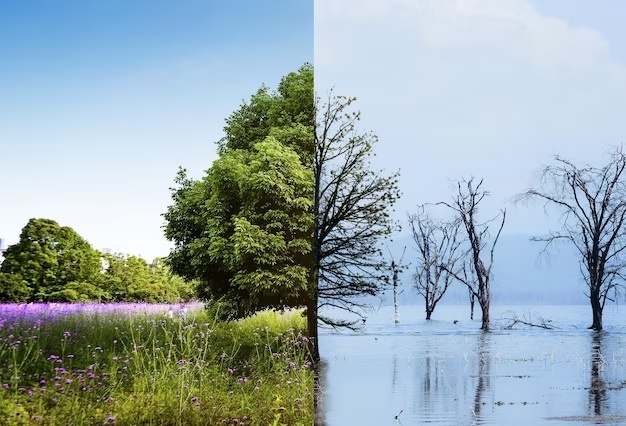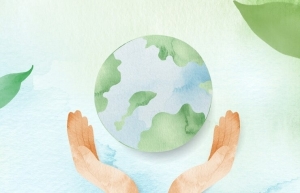The Paris deal climate initiative that could escalate greenwashing
Greenwashing is when companies or countries use deceptive claims to convince the public that their products or operations are environmentally friendly.
 |
| The Paris deal climate initiative that could escalate greenwashing, illustration photo/ Source: freepik.com |
In 2015, the headlines from the Paris Agreement focused on the landmark commitment to limit the rise in global average temperature to well below two degrees Celsius above pre-industrial levels. The aim was to pursue a 1.5C threshold.
Few paid much attention to Article Six at the time, but it authorised mechanisms for voluntary "cooperation" between countries -- and private companies -- to achieve promised emissions reductions.
The implementation of these mechanisms for countries has remained a point of contention ever since.
Now the supervisory body created during COP26 in 2021 has to iron out the details in early November, so a plan can be presented to COP28 in Dubai later the same month.
That plan could pave the way for the large-scale implementation of such mechanisms by the beginning of 2024.
Here are some key aspects:
Article Six permits a country that reduces its greenhouse gas emissions beyond its Nationally Determined Contribution (NDC) target to trade its "surplus" reductions with another country.
It is designed to replace the "Clean Development Mechanism" of the Kyoto Protocol from COP3, allowing developed countries to offset their emissions by funding emission-reducing projects in developing nations.
The article states that these "voluntary" efforts are intended to "allow for higher ambition".
Critics however see the mechanism as a free pass for countries to avoid reducing their own emissions, simply by paying for someone else to essentially do their homework.
Others worry that Article Six risks reproducing old North/South divisions of the UN system.
- Market logic -
The article allows for public and private entities to "contribute" through projects that foster "sustainable development".
These projects could for example combat deforestation, reinforce crucial carbon sinks, or replace coal-fuelled power plants with those running on renewable sources.
They make it possible to receive a carbon credit in exchange for every tonne of CO2 kept out of, or removed, from the atmosphere.
But these credits -- bought by corporations hoping to claim themselves "carbon neutral" by compensating for their emissions -- are highly controversial.
Numerous scientific studies have found the claimed reductions to be largely overestimated, or even nonexistent.
Critics fear that in a state carbon compensation market, rich countries and in particular fossil fuel-based economies might try to purchase a green image without actually decarbonising.
And while a supervisory body was created to develop a proper methodology, doubts remain about the certification of carbon credits if left to private organisations.
- Countries that cooperate -
Several countries are ready to go. Switzerland, an early adopter, has already closed 13 agreements across Africa, South America, Asia and even Ukraine.
It plans to fund wood stove replacements in Ghana and Peru, and renewable energy infrastructure.
Singapore has signed an agreement with Morocco, and Japan has signed with several countries including Tunisia and Senegal.
According to several media outlets, the United Arab Emirates, host of COP28, is in the process of signing with a number of African nations.
That reportedly includes a deal with Liberia that would grant it the right to "protect" forests on 10 percent of its territory in exchange for carbon credits.
Saudi Arabia, the largest exporter of crude oil, announced an "Article Six-aligned" scheme in October. Indonesia, the largest exporter of coal, launched its carbon emissions credit trading in September.
Honduras, Suriname, Guyana, Belize, Kenya, Zimbabwe, Democratic Republic of Congo... the list is long for countries lining up to trade their forests for carbon credits.
The European Union does not intend to use carbon credits until at least 2030, but says it will support countries that use them credibly.
 | Heavy industry turns to carbon capture to clean up its act For decades heavy industry around Dunkirk in northern France has belched out millions of tonnes of climate-heating gases. |
What the stars mean:
★ Poor ★ ★ Promising ★★★ Good ★★★★ Very good ★★★★★ Exceptional
Related Contents
Latest News
More News
- $100 million initiative launched to protect forests and boost rural incomes (January 30, 2026 | 15:18)
- Trung Nam-Sideros River consortium wins bid for LNG venture (January 30, 2026 | 11:16)
- Vietnam moves towards market-based fuel management with E10 rollout (January 30, 2026 | 11:10)
- Envision Energy, REE Group partner on 128MW wind projects (January 30, 2026 | 10:58)
- Vingroup consults on carbon credits for electric vehicle charging network (January 28, 2026 | 11:04)
- Bac Ai Pumped Storage Hydropower Plant to enter peak construction phase (January 27, 2026 | 08:00)
- ASEAN could scale up sustainable aviation fuel by 2050 (January 24, 2026 | 10:19)
- 64,000 hectares of sea allocated for offshore wind surveys (January 22, 2026 | 20:23)
- EVN secures financing for Quang Trach II LNG power plant (January 17, 2026 | 15:55)
- PC1 teams up with DENZAI on regional wind projects (January 16, 2026 | 21:18)

 Tag:
Tag:



















 Mobile Version
Mobile Version